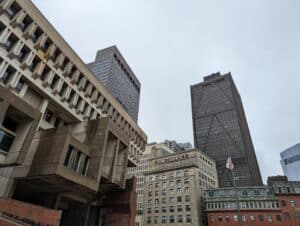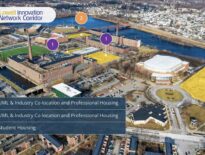
Boston City Hall and downtown Boston office buildings seen from City Hall Plaza. Photo by James Sanna | Banker & Tradesman Staff / file
Starting in July, many of the main functions of the Boston Planning & Development Agency will be transferred over to a new city Planning Department following a combative City Council vote Wednesday afternoon.
But key elements, like the department’s funding and the powers of what will remain in the BPDA are still up in the air while state lawmakers consider a companion home rule petition.
The vote marks a major win for Boston Mayor Michelle Wu, who vowed to dismantle the BPDA as a candidate, and a loss for many voices in the real estate industry who argued the move was unnecessary and for one of the Boston City Council’s left-most members, who argued the changes won’t create the advertised democratic control over new development.
The vote also does not change the current approval process for commercial real estate developments, which must still be approved by the existing BPDA board and, if necessary, Zoning Board of Appeal under the existing Article 80 zoning process, which will be run by existing BPDA staff transferred to the new Planning Department.
Reforms to the Article 80 process, which Wu has pledged will significantly speed up development review, are ongoing alongside a rezoning effort for the city’s neighborhood nodes, known as Squares + Streets.
“It is forward-thinking planning that must dictate development, not the other way around. We have reiterated time after time that planners and those who write zoning must be held accountable by policymakers and those who elect them,” East Boston City Councilor Gabriela Coletta, who led the council’s review of Wu’s proposed resolution, told her colleagues. “Separately, the real estate industry has said now is the perfect time, given that the volume has turned down a bit and we’re at a good space to institute change before the market ramps up.”
Coletta argued that changes during her committee’s review ensure city councilors will have greater oversight of the department’s activities and the ability to call city planning and development review staff in for hearings, even if the power to approve developments and zoning changes will still rest with the BPDA board of directors and the Boston Zoning Commission, respectively.
Councilor Julia Mejia disagreed and sought, both times unsuccessfully, to first create an commission composed of city residents to oversee the Planning Board – something the Wu administration was vehemently opposed to – and then to send the measure back to committee for more negotiations.
Real estate industry leaders have fretted the City Council’s new powers could let its members magnify some neighborhood factions’ opposition to new housing or other development, and argued the BPDA’s structure as an independent entity funded by property leases and not the city budget let its leaders make tough decisions that ensured developments could take place that allow the city’s economy to continue growing.
“After 18 years of doing development community process, it will not gain trust in the community. We will have the exact same problems, but we will have moved them to a different entity. Folks don’t care so much about the planning process but ‘will it impact my quality of life,'” said Dorchester Councilor John FitzGerald, a former BPDA staffer. “But as we all know, the city must grow and we must manage these differences.”
Funding for the Planning Department and the remaining parts of the BPDA that won’t be transferred is still up in the air, as it relies on a to-be-negotiated memorandum between Wu and BPDA Director Arthur Jemison.
Also unsettled: the remaining BPDA’s powerful urban renewal tools, which Wu is asking state legislators to redefine them from combating “blight and decadence” to promoting “climate resiliency, affordability and equity.”




 |
| 

